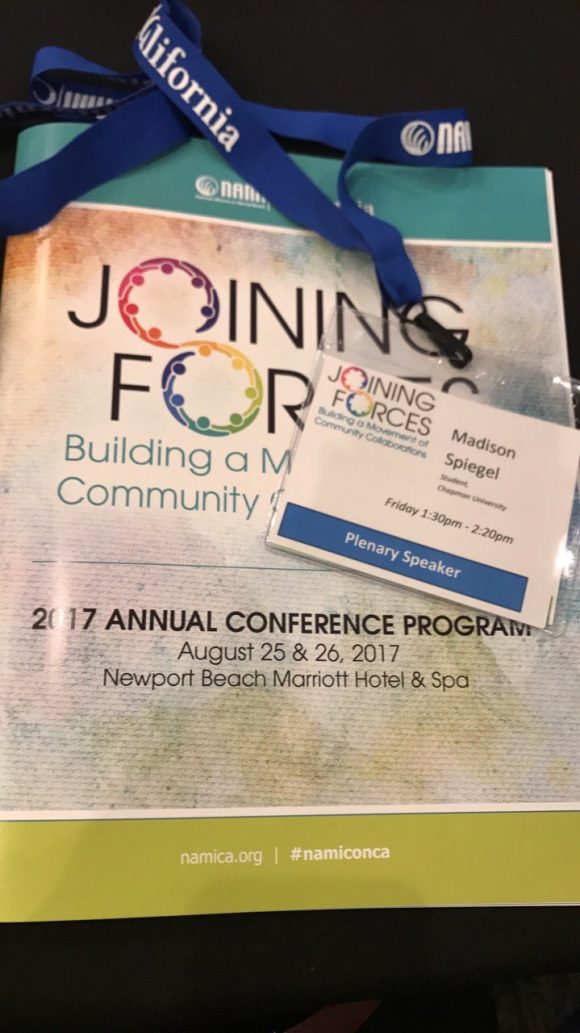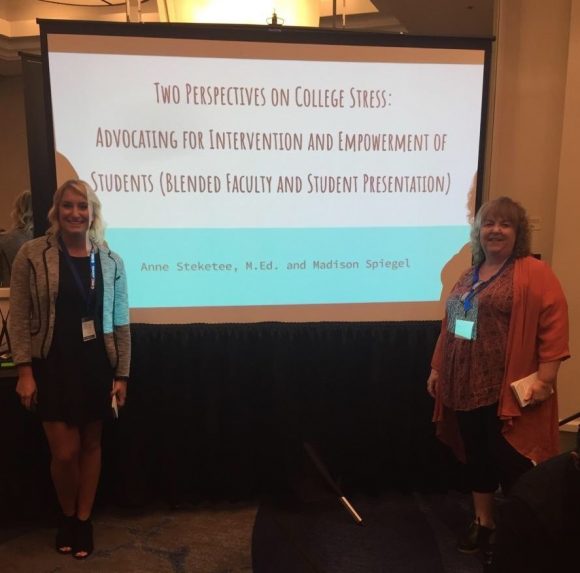
Attallah College Lecturer and Student Present Blended Plenary Session on Stress at NAMI California Conference
September 1, 2017
An Attallah College lecturer and student teamed up to present at the recent National Alliance on Mental Illness (NAMI) conference in Newport Beach. Chapman University students presenting at conferences may be commonplace, but this presentation was special for several reasons.
 Integrated Educational Studies senior Madison Spiegel had never presented at a conference before. She had researched a topic for class that she was familiar with, college stress among students, never imagining that she would have the opportunity to share her work. As soon as Spiegel learned of the upcoming conference from her mentor, the collaboration began.
Integrated Educational Studies senior Madison Spiegel had never presented at a conference before. She had researched a topic for class that she was familiar with, college stress among students, never imagining that she would have the opportunity to share her work. As soon as Spiegel learned of the upcoming conference from her mentor, the collaboration began.
“Anne introduced me to the conference. She really liked a paper that I wrote and thought it would be an interesting topic to present,” said Spiegel. “The project just went from there. We submitted a proposal for a workshop, but we were asked to do a plenary session instead.”
Attallah College Doctoral student and Chapman lecturer Anne Steketee had seen the effects of stress on her students firsthand and wanted to study the topic further.
“While teaching here, I’ve noticed that students are affected by the stressors in their daily lives and on campus,” she said. “These stressors impact student populations in different ways. Professors have a unique opportunity to design course work, embed communication strategies, and differentiate certain class features to support all students. Student engagement and outcomes might benefit from consideration of research around the issue of college student depression.”

Once Steketee suggested they collaborate on a presentation proposal and it was accepted, they chose to title their paper, Two Perspectives on College Stress: Advocating for Intervention and Empowerment of Students. Each would focus specifically on what they were most familiar with, alternating between student and teacher viewpoints.
“I have had to advocate for myself in many different situations throughout college,” Spiegel said. “It is extremely important for students to be able to advocate for themselves and to know what resources are available to them. I was lucky enough to have Anne as a mentor to lead me through the process, but not many students have that. College is an extremely stressful time and it can become overwhelming.”
Preparing for their presentation alongside one another, there were several facts that Spiegel and Steketee wanted to impress upon their audience. These included raising awareness of student stressors and increasing self-advocacy for students. Aside from these key points, they hoped to (1) More clearly understand the various components fueling student stress and be prepared to look for the increasing warning signs, (2) Employ advocacy strategies within the community and on the campus and be equipped to assist college students with self-advocacy skills, and (3) Empower students with opening conversations about ways to reduce stress centered on faculty methods, university policies, and procedures.

Attallah College Assistant Professor and Associate Dean of Undergraduate Education, Michelle Samura, praised both scholars for presenting a plenary session that she said is quite rare.
“The Integrated Educational Studies (IES) program deeply values student-faculty collaborations, and IES faculty actively encourage students to engage in research and professional opportunities,” Samura said.
“Not only am I thrilled that Professor Steketee and Madison submitted a conference proposal based on a scholarly paper initiated by Madison in IES 303: Education Through Life Transitions, but the fact that the conference organizers recognized the quality and importance of their work and invited them to present as a plenary presentation is especially notable” she continued. “This is a unique opportunity for an undergraduate student. This is a big deal.”
We checked in with Professor Steketee after the presentation and she could not have been more pleased with the outcome.
“Our session was standing room only!” said Steketee. “The response was phenomenal! One professor took all of the remaining handouts to give to the students at his university and several NAMI coordinators spoke with me about working together to continue the conversation regarding professor responsiveness and ethic of care on campus.”

